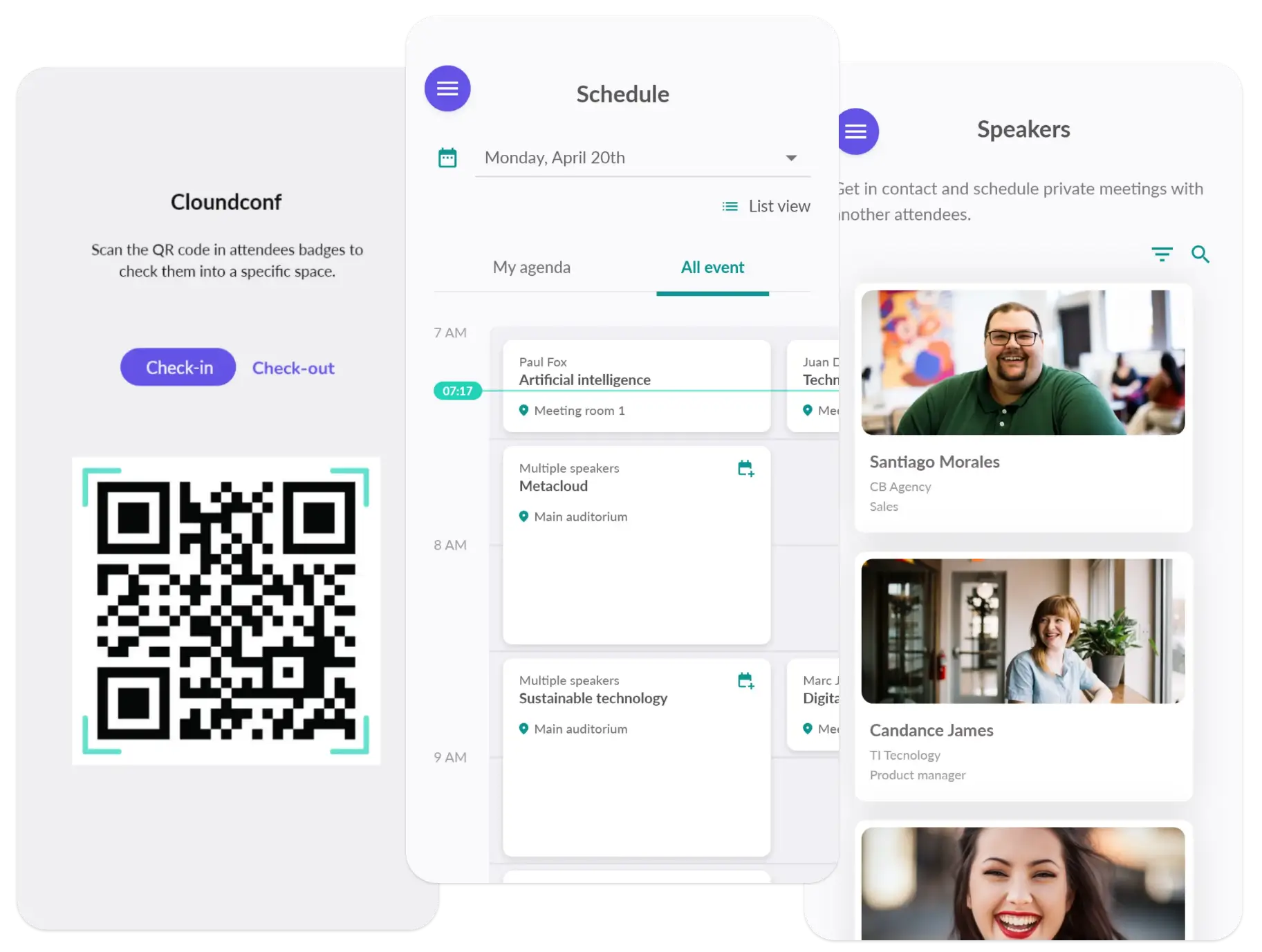Event Management,
Simplified
Digitized
Efficient
Scalable
Eventtia’s all-in-one event management software simplifies event planning and elevates the attendee experience.
Get started





In-person | Virtual | Hybrid Events
One Event Platform,
Powerful Solutions for All
Features
Optimize Every Aspect of Your Events
Eventtia's all-in-one event software offers a wide variety of solutions to optimize event planning, execution and monitoring.
Event registration & promotion
Attendee experience
Data & reports
Event Registration
Manage advanced attendee registrations with customizable forms, group registrations, and more.
Discover event registrationsTicketing & Payments
Manage tickets and payments with Stripe, PayPal, and others. Offer early-bird tickets, discount codes, and other premium options.
Discover event ticketingEvent Marketing & Promotion
Design beautiful and branded event pages and websites, with a drag-and-drop editor. Personalize Email and SMS messages for attendees.
Discover event marketingOn-site Check-in
Simplify on-site check-in with QR code scanning, register participants at the last minute and monitor attendance at specific sessions.
Discover on-site check-inEvent App for In-Person Events
Offer your attendees a seamless and interactive digital experience with a branded mobile app for accessing their agenda, networking, and more.
Discover event mobile appEvent App for Virtual & Hybrid Events
Invite thousands of participants worldwide to your virtual and hybrid events, featuring live chat, networking, and gamified experiences.
Discover virtual events appMatchmaking & One on One Meetings
Facilitate one-on-one meetings at your events with a powerful networking and matchmaking solution.
Discover event matchmaking appEvent Data & Analytics
Monitor registrations, payments, and attendance, measure real-time session activity and collect feedback effortlessly.
Discover event data & analyticsOpen API
Seamlessly connect any digital service with Eventtia. Create custom workflows and build your own event experiences on top of Eventtia’s platform
Explore API capabilitiesEnterprise-level
features & services
Scale your event strategy with enterprise-level solutions dedicated to global companies.
Explore enterprise solutionsEventtia Demos
See Eventtia in Action
Explore Eventtia's features and discover how they enhance event planning and experience.
Achieve All Your Goals in One Place
Create memorable events
Create unforgettable experiences with personalized features, leaving a lasting impact on attendees.
Optimize event management
Seamlessly organize events from start to finish, ensuring smooth operations and boosted productivity.
Maximize ROI
Optimize event outcomes with strategic planning and enhanced attendee experiences, ensuring maximum return on investment.
Create memorable events
Create unforgettable experiences with personalized features, leaving a lasting impact on attendees.
Optimize event management
Seamlessly organize events from start to finish, ensuring smooth operations and boosted productivity.
Maximize ROI
Optimize event outcomes with strategic planning and enhanced attendee experiences, ensuring maximum return on investment.
Advanced Personalization
Design any interface and build any experience you like, in total respect of your brand guidelines.
Unlimited Integrations
Make event management ten times easier by integrating Eventtia to your own IT services.
True Culture of Partnership
Benefit from an agile and dynamic team, ready to tackle any challenge together as partners.
What Success Looks Like
4.5
Based on +300 ratings
Resources
You Might Also
Be Interested In
Customer success stories
Discover how top brands are making successful events, delivering unforgettable experiences while optimizing event planning.
Discover success storiesWhat is event management?
Discover key event management strategies, essential tools, and expert tips to plan and execute successful events effortlessly.
Read articleBlog articles
Explore articles that educate and inspire event professionals around the world.
Read blog articlesProduct news & updates
Discover Eventtia's new features for in-person, virtual and hyrid events.
Discover new featuresFrequently Asked Questions
The purpose of event management software is to streamline the planning, coordination, and execution of events through a centralized digital platform. An event management software enables you to manage registrations, ticketing, scheduling, communication, and event analytics in one place.
By using a professional event management solution, you can make your event planning more efficient, scalable, and organized. It reduces manual tasks and enhances the attendee experience by bringing all event operations into a single, easy-to-use system.
Event management software is designed for event planners, marketers, HR professionals, and organizations that host events such as conferences, trade shows, workshops, or corporate gatherings.
This type of software simplifies event logistics, enhances attendee engagement, and ensures seamless event execution from planning to post-event analysis.
The software helps simplify event logistics, boost engagement, and ensure seamless execution from conception to finish.
Key features to look for in event management software include registration management, customizable event websites, attendee communication tools, and real-time analytics.
Additional helpful features include a mobile check-in app, virtual and hybrid event capabilities, and integrations with CRM or marketing automation tools. A user-friendly interface and scalable design are also important if you’re planning to grow your event portfolio over time.
Yes, event management software can be used to manage virtual and hybrid events effectively. Platforms like Eventtia offer built-in tools for virtual experiences, including live streaming, breakout rooms, virtual booths, and real-time engagement features such as polls and chat.
These platforms also support the centralized coordination of both in-person and online components, making it easier to deliver a seamless and professional hybrid event experience.
Eventtia is an event management software that lets you manage every stage of your event, from planning to execution, all within one platform.
You can handle event registration, ticketing, payments, marketing campaigns, attendee check-ins, and engagement tools, all while leveraging real-time event data and analytics to improve performance and ROI.
With Eventtia, you also benefit from a fully customizable solution and support from a dedicated team, ensuring your event runs smoothly and meets your specific goals.
Eventtia offers a variety of license plans starting at USD 500 or 500€.
The final price of your plan can be influenced by several factors, including:
– Number of registered attendees
– Number of users on your Eventtia account
– Access to specific features and modules
– White label options
– API usage
– Other custom needs
We understand that every event is unique. Therefore, each plan can be tailored to meet your specific requirements.
For a personalized quote, please fill out our contact form. We’re here to help you find the best solution for your event needs.
Eventtia offers support in English, Spanish, and French 14 hours a day, 5 days a week, with teams based in France, Spain, Mexico, and Colombia. You can reach us via live chat, email, or phone.
We provide training and onboarding, and each account is assigned a dedicated manager.
Premium customer support is also available for assistance with creating and managing your events.
Yes, some of the world’s top brands have been leveraging Eventtia’s API for many years, to seamlessly exchange data between Eventtia and their existing IT systems for customer management (CRM), databases and datalakes, accounting platforms, marketing automation platforms, and others.
Some have even developed their own event platforms on top of Eventtia’s API.
For more information on Eventtia’s API services, please visit our API documentation.
At Eventtia, we pride ourselves on fostering strong and long-lasting partnerships with our clients.
That’s why leading companies such as Coca-Cola, Van Cleef & Arpels, Toyota, Nestle, Bioderma, BBVA, Pernod Ricard, and many others have partnered with Eventtia, to help them digitize and scale their events.
Unlike other platforms, Eventtia offers a fully customizable and evolutive event management software tailored to meet your unique needs . With Eventtia, you have the freedom to execute your events precisely the way you envision, in total respect of your brand guidelines.
For a tailored experience that truly showcases the value Eventtia can bring to your events, we recommend reaching out to us directly so we can better assess your requirements and arrange a personalized live demo call.
During this call, we’ll walk you through real-life examples, demonstrating how Eventtia can address your specific needs and enhance your events.
To schedule a live demo call, you can contact our experts, using the live chat feature on our website or simply by filling out the “Book a Call” form above.
You can also discover Eventtia’s features in action, by visiting our interactive demos page.
+300 REVIEWS
Ready to Get Started?
Please fill out the form to book a demo with our team. We'll contact you as soon as we can.
+300 REVIEWS
Please fill out the form to book a demo with our team. We'll contact you as soon as we can.